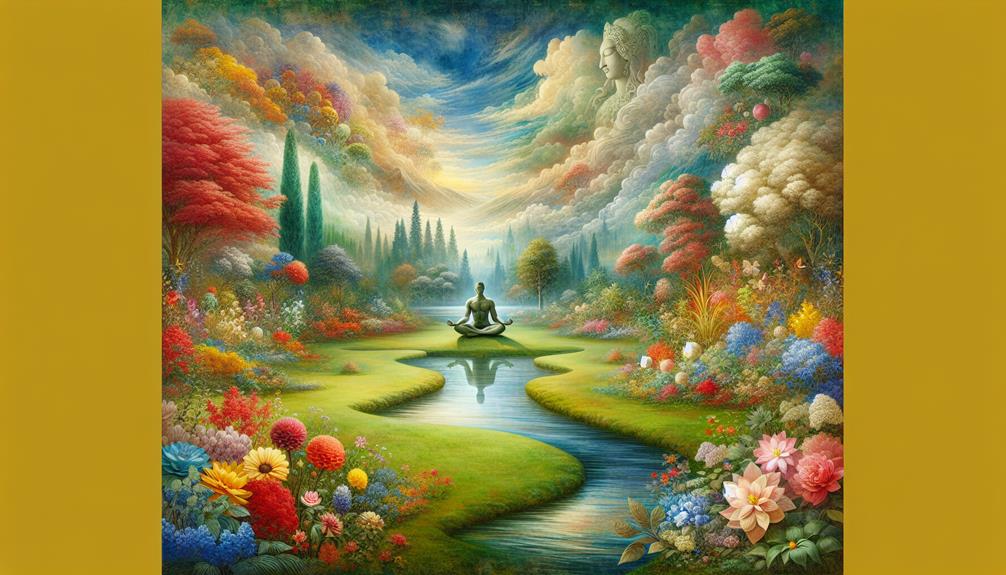What Does Kama Mean Religion
The concept of 'Kama' in religion holds a multifaceted significance that extends beyond mere desire or pleasure. Across various faith traditions, 'Kama' is imbued with layers of spiritual depth and ethical considerations. It plays a pivotal role in shaping moral conduct and guiding individuals on their spiritual journey.
What Does Kama Mean Religion
Furthermore, in the context of contemporary society, the essence of 'Kama' continues to evolve, raising intriguing questions about its relevance and application in our daily lives.
What Does Kama Mean Religion
Key Takeaways
- 'Kama' signifies balanced pursuit of desires within moral boundaries in various religions.
- It plays a vital role in spiritual practices for self-awareness and personal growth.
- Moderation in fulfilling desires is crucial for spiritual evolution and societal harmony.
- 'Kama' guides individuals to find joy, make ethical choices, and balance personal and societal responsibilities.
Origins of 'Kama' in Religion
The concept of 'Kama' in religion traces its origins back to ancient Indian scriptures such as the Vedas and Upanishads. In these sacred texts, 'Kama' is often associated with desires, pleasure, and fulfillment. It goes beyond mere physical desires to encompass emotional, mental, and spiritual aspirations. 'Kama' is seen as one of the four goals of human life, known as the Purusharthas, along with Dharma (duty), Artha (prosperity), and Moksha (liberation).
What Does Kama Mean Religion
Within Hinduism, 'Kama' is viewed as a legitimate and essential pursuit when balanced with the other goals. It is believed that fulfilling one's desires with righteousness and in harmony with societal norms can lead to personal growth and happiness. 'Kama' is not just about sensual pleasures but also about fostering emotional connections, creativity, and appreciation of beauty in all its forms. It encourages individuals to embrace their desires in a way that uplifts the self and society as a whole. The roots of 'Kama' run deep in these ancient scriptures, shaping perspectives on desire, pleasure, and the human experience in religion.
What Does Kama Mean Religion
Interpretations Across Different Faiths
Across various faith traditions, diverse interpretations of the concept of 'Kama' reveal nuanced understandings of desire and fulfillment within religious contexts.
What Does Kama Mean Religion
In Hinduism, 'Kama' is often seen as one of the four goals of life, emphasizing the pursuit of pleasure and emotional fulfillment within the boundaries of dharma (duty or righteousness).
In Buddhism, 'Kama' is viewed as one of the three poisons alongside greed and hatred, highlighting the importance of overcoming worldly desires to achieve spiritual liberation.
In Jainism, 'Kama' is considered a form of attachment that binds the soul to the cycle of birth and death, advocating for detachment to attain spiritual purity.
- Hinduism: Emphasizes pleasure and emotional fulfillment within the boundaries of dharma.
- Buddhism: Views 'Kama' as a poison that hinders spiritual liberation.
- Jainism: Considers 'Kama' a form of attachment that impedes spiritual purity.
Role of 'Kama' in Spiritual Practices
Exploring the significance of 'Kama' in spiritual practices sheds light on the intricate relationship between desire, fulfillment, and the pursuit of spiritual growth within various religious traditions. 'Kama', representing human desires and pleasures, plays a crucial role in spiritual practices by serving as a means to connect individuals with their inner selves and the divine. In many faiths, including Hinduism and Buddhism, 'Kama' is not condemned but rather integrated into the spiritual journey as a tool for self-awareness and transformation.
Spiritual practices often involve balancing 'Kama' with other pursuits like 'Artha' (material wealth) and 'Dharma' (duty/righteousness) to achieve a harmonious life. By acknowledging and understanding desires through 'Kama', individuals can navigate their spiritual paths more consciously, leading to personal growth and a deeper connection with the divine. The role of 'Kama' in spiritual practices encourages individuals to explore the depths of their desires, ultimately guiding them towards a more fulfilling and spiritually enriched life within the context of their religious beliefs.
Kama' and Moral Implications
Considering the ethical dilemmas surrounding the expression of desires and pleasures, 'Kama' in various religious contexts often raises profound moral implications. The concept of 'Kama' delves into more than just the pursuit of desires; it also touches upon the ethical considerations that come with it. When exploring the moral implications of 'Kama' within religious frameworks, several key points emerge:
- Balancing Material Desires with Spiritual Growth: Many religions emphasize the importance of moderation and balance in fulfilling desires while also focusing on spiritual development.
- Respect for Boundaries and Consent: Discussions around 'Kama' often involve considerations of respecting boundaries and ensuring that desires are pursued consensually and ethically.
- Impact on Personal and Social Harmony: The pursuit of desires, as encapsulated by 'Kama', can have far-reaching effects on personal well-being and societal harmony, prompting reflections on the broader implications of individual actions.
Navigating the moral landscape surrounding 'Kama' requires a nuanced understanding of desires, ethics, and their interplay within religious and spiritual contexts.
Modern Relevance of 'Kama
In contemporary society, the concept of 'Kama' continues to hold relevance as it intersects with modern values and societal norms. 'Kama', with its emphasis on desire, pleasure, and ethical living, provides individuals with a framework to navigate complex moral dilemmas and personal relationships in today's world. This ancient concept offers a timeless perspective on how individuals can seek fulfillment while upholding moral principles.
—
| Modern Relevance of 'Kama' | |
|---|---|
| *1. Personal Fulfillment* | *2. Ethical Decision Making* |
| Emphasizes finding joy in daily life | Guides individuals in making morally sound choices |
| Encourages self-care and mindfulness | Considers the impact of actions on oneself and others |
| Promotes healthy relationships | Balances personal desires with societal responsibilities |
| Advocates for authenticity and self-awareness | Considers long-term consequences in decision-making processes |
—
Frequently Asked Questions
How Does the Concept of 'Kama' Differ in Eastern and Western Religions?
The concept of 'kama' differs in Eastern and Western religions due to varying cultural and philosophical foundations.
In Eastern religions like Hinduism and Buddhism, 'kama' is often associated with desire, pleasure, and the pursuit of sensory enjoyment within the context of a holistic life approach.
However, in Western religions such as Christianity and Islam, 'kama' may be viewed in a more restrictive manner, emphasizing moderation and control over desires to achieve spiritual growth and moral integrity.
Are There Any Specific Rituals or Practices Associated With 'Kama' in Certain Faiths?
Specific rituals or practices associated with 'kama' vary among different faiths.
For example, in Hinduism, 'kama' is often linked to the pursuit of pleasure within the boundaries set by dharma (duty). This can manifest through rituals like puja (worship) dedicated to deities associated with love and desire.
In Buddhism, 'kama' is approached with a focus on mindfulness and moderation, often integrated into meditation practices to cultivate awareness of desires and attachments.
Can 'Kama' Be Seen as a Form of Self-Discipline or Self-Control in Spiritual Practices?
Certainly, 'kama' can indeed be viewed as a form of self-discipline and self-control in spiritual practices. By cultivating restraint and moderation in desires, individuals can enhance their spiritual growth and inner peace.
Embracing 'kama' as a means of regulating one's impulses can lead to a deeper connection with oneself and a greater sense of harmony with the world around them. It serves as a guiding principle for balanced living and spiritual fulfillment.
How Does the Concept of 'Kama' Relate to the Idea of Karma in Hinduism and Buddhism?
The concept of 'kama' in Hinduism and Buddhism is closely related to the idea of karma. Kama refers to desire, pleasure, and sensual gratification, while karma pertains to the law of cause and effect, where actions have consequences.
In this context, kama influences one's actions and intentions, which in turn impact their karma. Understanding the interplay between kama and karma is essential in comprehending how desires and actions shape one's spiritual journey in these faith traditions.
Is the Concept of 'Kama' Still Relevant in Today's Modern Society With Changing Values and Beliefs?
In today's rapidly evolving society with shifting values, the relevance of the concept of 'kama' persists as a symbol of desires and pleasures. As individuals navigate modern complexities, understanding one's desires and maintaining balance becomes crucial.
'Kama' serves as a reminder of the importance of pursuing desires mindfully, aligning actions with values, and finding fulfillment amidst changing beliefs. Its essence transcends time, offering insights into human nature and aspirations in a contemporary context.
Conclusion
In conclusion, the concept of 'Kama' in religion has diverse origins and interpretations across different faiths. It plays a vital role in spiritual practices and carries moral implications.
Despite its ancient roots, 'Kama' remains relevant in modern society, guiding individuals in their pursuit of desires and balance in life. Its enduring significance underscores the timeless wisdom embedded in religious teachings.

